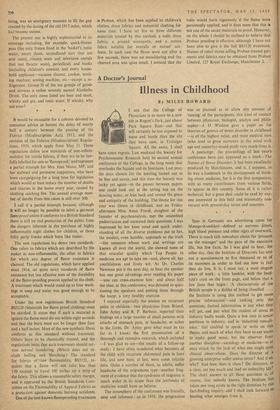A Doctor's
Journal
Illness in Childhood
By MILES HOWARD I SEE that the College of Physicians is to move to a new site in Regent's Park, just above Park Square East—and that will certainly be less exposed to noise and bustle than the site they have now, in Trafalgar Square. All the same, I shall have some regrets. Last weekend the Society for Psychosomatic Research held its second annual conference at the College, in the long room that overlooks the Square and its fountains. Last year, the days chosen for the meeting turned out to be fine and sunny, and this time the Society was lucky yet again—in the pauses between papers one could look out at the spring sun on the dancing water, or lean back and savour the grace and antiquity of the building. The theme for this year was illness in childhood, and on Friday afternoon Miss Anna Freud, daughter of the founder of psychoanalysis, met the assembled pa3diatricians and answered their questions. I was impressed by her keen mind and quick under- standing of all the diverse problems put to her, the modest, even humble, approach to the truth —for someone whose work and writings are known all over the world, she showed none of that oracular quality which Top People in medicine are apt to take on—and, above all, her youthfulness and lively wit. As Dr. Charles Newman put it the next day, to hear the speaker has one great advantage over reading his paper —you can cross-examine him : and about half the time, at this conference, was devoted to ques- tioning the speakers and putting them through the hoop; a very healthy exercise.
I enjoyed especially the session on recurrent pains in children : two physicians from Bristol, John Apley and R. F. Barbotir, reported their findings on a large number of small patients with attacks of stomach pain, or headache, or aches in the limbs. Dr. Apley gave what must be (as far as I know) the first presentation of a thorough and extensive research, which included —I was glad to sec—the results of a follow-up study : I have often wondered what becomes of the child with recurrent abdominal pain in later life, and now here, at last, were some reliable data. Quite a number of them, as adults, suffer headache of the migrainous type—another frag- ment of evidence that the syndrome of migraine is much wider in its scope than the textbooks of medicine would have us believe.
The atmosphere of the conference was friendly, easy and informal: as in 1958, the programme was so planned as to allow any amount of 'mixing' of the participants; this kind of contact between physician, biologist, analyst and philo- sopher—J. 0. Wisdom gave a paper on the theories of genesis of stress disorder in childhood —is of the highest value, and most medical men (who tend to grow narrower in the mind with age and seniority) would profit very much from it.
A postscript: the proceedings of last year's conference have just appeared as a book—The Nature of Stress Disorder; it has been excellently produced by Hutchinsons, and is, I suppose, in its way a landmark in the development of think- ing about medicine, for it is the first symposium, with so many contributors from various fields, to appear in this country. Some of it is rather technical, but a great deal could be read by any- one interested in this field and reasonably con- versant with present-day terms and concepts.
Spas in Germany are advertising cures for Managerkrankheit—defined as nervous jitters, high blood pressure and other signs of overwork. There is much talk nowadays about the 'pressure on the manager' and the pace of the executive life, but few facts. So I was glad to hear, the other day, that the Institute of Directors has sent out a questionnaire to five thousand or so of its members in order to find out how in fact they do live. It is, I must say, a most elegant piece of work : a little booklet, with the Insti- tute's crest on the front page, and below that a few lines that begin : 'A characteristic of the British people is a dislike of being classified . . . the Institute is using this method to get some precise information'—and looking over the questions, factual information is just what they will get, and just what the student of stress in industry badly needs. Quite a few men in senior positions in industry, and in 'industrial consult- ancy.' feel enabled to speak or write on this theme, and much of what they have to say seems to make good sense, but the observer from another discipline—sociology or medicine—is at once struck by the lack of what one might term clinical observations. Does the director of a growing enterprise suffer undue stress? And if so, why? And how does it show? Do directors, as a class, eat too much and lead an unhealthy life? The short answer to all these questions is, ei course, that nobody knows. The Institute has taken one long stride in the right direction by this fact-finding inquiry, and I shall look forward to hearing what emerges from it.


































 Previous page
Previous page